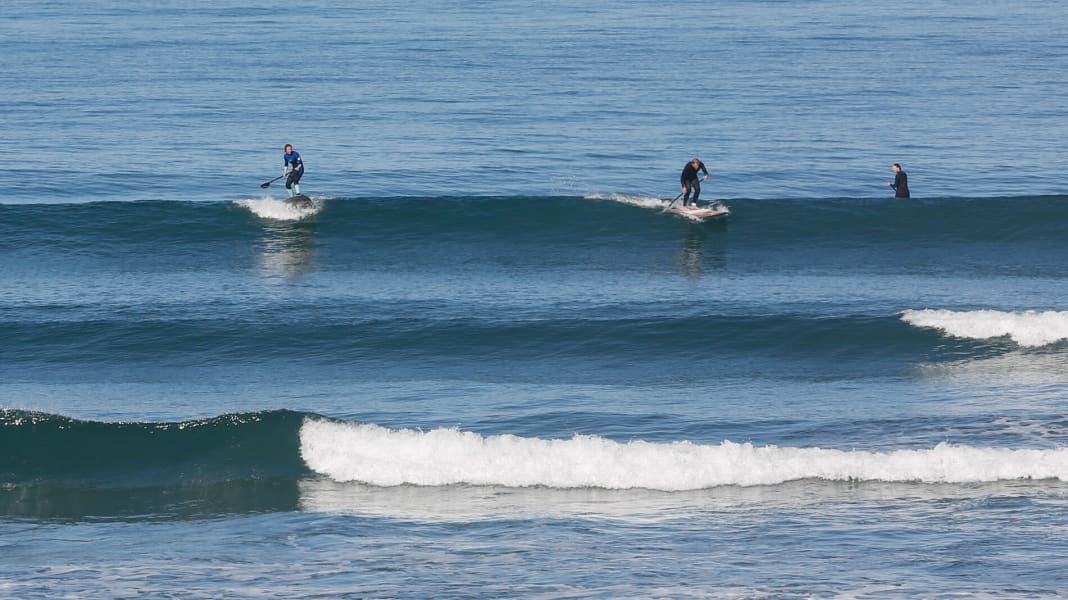Etiquette in the wave


Philipp Kuretzky is the current president of the German Surfing Association and also an instructor in the VDWL - the Association of German Surfing Instructors. Peter Rochel from the SUP Online Academy spoke to him about stand up paddlers in wave areas and surfers, some of whom don't seem to have a good opinion of SUPers. Why this is the case and what we can do to avoid making ourselves even more unpopular as stand up paddlers and stirring up hostility is the subject of the podcast, which you can listen to in full on the Online Academy website. Here you will find a quick overview of the most important statements kindly made available.
Peter Rochel:Hello Philipp, welcome!Philipp: Hi.
Is surfing the real deal? Anyone who is so presumptuous as to say that surfing is the only real thing in Germany has little to do with reality. Surfing is simply hardly possible in Germany. Only on a few days on Sylt and on standing waves in Bavaria in particular.
We are now in the summer holidays and many people are heading off to spots on the coast to explore the waves. They want to go SUP surfing. Where is the potential for contact? The stand-up paddlers who are now coming to wave areas - and have perhaps already gained previous experience in Germany - can stand on their board, can turn with it, can perhaps paddle quickly with it. They already have a lot of techniques - board techniques - that you don't have as a surfer when you start out. A surfer who starts out in the sea begins by learning to paddle. To lie on the board first. They have to deal with the wave much more intensively. The SUPer gets there, he can already do it all, but he may never have had anything to do with a wave in his life. But they are way ahead of surfers. He paddles into the line-up very quickly, paddles quickly to where the wave breaks. Then there's the potential conflict that the surfer gets the wave later and the SUP rider may not even know the rules of right of way. As a result, surfers develop a kind of hatred for SUPers because they are much more agile and get to positions faster where the surfer wouldn't be able to get to. I would say it's not a conflict at all, it's perhaps often envy. When the best and biggest wave goes to the SUPer. Or if the SUPer is in the way, they quickly become aggressive because the SUPer doesn't know how to dive through with the board. Such a large SUP is super difficult to handle. And someone who has already gained a lot of experience on the river or lake can't necessarily dive through a wave well. Then they jump over the wave, the board flies backwards and hits some surfer on the head.
How can you behave better? It is important to learn how to handle the board safely. Also, boards that are not too big. You would also never give a beginner a longboard for surfing. Although they will of course get a lot of waves and it's easier, handling a longboard is much, much more difficult. So for SUPers too: take a small, manageable board, an inflatable might not be a bad idea either because it poses less risk of injury. A 14-foot race board in the waves is a bad idea. Even short boards can still have enough volume.
What about leashes? Yes or no? In any case, the leash is part of it! However, you should always be able to swim back to shore without a board.
We often use coil leashes. What is useful in the wave area? The leash should always be as long as the board itself. That way it won't jeopardise you even if it turns over. A thinner leash is sufficient in small waves, but as a SUPer you won't notice much difference and I would always recommend a thicker leash because it can withstand more.
What else should I consider as a beginner? In any case, inform yourself about the local conditions. Then start on a sandy beach first. A nice, wide beach break with a sandy surface. This minimises the risk of injury. It makes a lot of sense to take a surfing course. It doesn't have to be a SUP course. It's not about learning to surf, but about learning basic behaviour and rules. And also a few safety stories. There are dangerous currents. How do I recognise them, how do I get out of them, how do I behave when I'm in them. Any surf instructor can explain that. Plus the rules of right of way that you have to follow, regardless of whether you're a surfer, SUPer, canoeist or bodyboarder. a wave has a direction of break. And whoever has the potentially longest ride has right of way. And whoever is stationary always has right of way anyway. Incidentally, this is the first problem, as the two sports clash. But we'll get to that later.
Where is the potential for conflict? Due to the larger volume in the SUPs, the SUPer is always standing. This then collides with the rule "He who stands is right". But there is actually a simple solution to this. The surfer only stands when they are gliding on the wave. It's exactly the same for the stand-up paddler. From the moment he glides on the wave, he no longer has to paddle. I would change the rule to "It's not the one who stands who is right, but the one who glides who is right." In surfing competitions, for example, the wave is only counted when your feet are on the board. This is always the case for SUPers. Then there is the rule with the potentially longest ride. "Whoever has the potentially longest ride owns the wave." A stand-up paddler potentially has the longest ride because they can paddle the wave to a point well before it breaks. The surfer has to sit much further towards the beach, the wave has to be much steeper for a surfer. If there are four or five stand-up paddlers at a spot who are masters of their sport, it can happen that the surfers don't get a single wave because they all legally belong to the SUPers.
An unfair advantage? Yes, but we live in a time when you could also install motors in your boards. But the problem can be solved through respect. A stand-up paddler who is good might have to realise "Okay, every second wave I would like to surf, I'll let it through and leave it to the surfers. Or I might even let a few more through." Then everyone in the water has an equal chance of getting their wave. If stand-up paddlers adopt this behaviour and don't always take the best and biggest wave, then conflicts can no longer arise.

